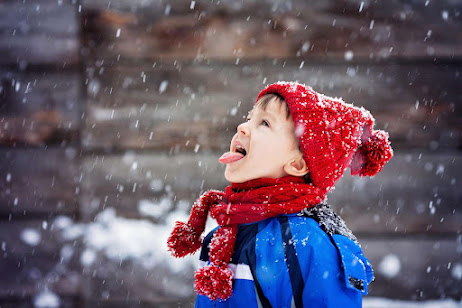As winter approaches, we present to you some valuable tips for preventing winter illnesses in children. During this season of unstable weather and cold nights, the immune system weakens slightly, making the body more susceptible to diseases. Children's bodies are more sensitive, which is why they are more prone to infections and can develop illnesses more easily. The fact that children often attend daycare centers, kindergartens, and schools increases the rate of winter illnesses among them.
Common winter illnesses that affect us and our children include the common cold, throat infections, coughs, the flu, and respiratory infections, usually due to the transmission of viruses from person to person through sneezing and nasal discharge, and their spread in the air in daycares, workplaces, public places, and enclosed spaces.
So, how can you successfully prevent children from getting winter illnesses, and what dietary system strengthens their immune system?
There are several helpful tips for preventing winter illnesses in children:
1. Ventilation and Fresh Air:
- Viruses in winter are present in the air. With every cough and sneeze, large quantities of viruses and bacteria are released into the air, which can survive there for several hours and infect other children. Therefore, it's essential to open windows and ventilate the room to reduce the number of viruses in the air. It's also a good idea to wear an extra layer of clothing and keep a window slightly open.
2. Separation and Hygiene:
- It's important to separate sick children from healthy ones at home, especially not letting them sleep in the same room.
- Maintain cleanliness by not sharing lollipops, bottles, cups, spoons, towels with saliva on them, and tissues used for wiping mucus.
- Ensure handwashing before meals, even a light wash. Bacteria and viruses are present there, and it doesn't matter if you eat an apple, a biscuit, or a full meal.
- Teach children the proper way to wash their hands (using soap and running water, for example, for 20 seconds).
- Pay special attention to cleaning sensitive areas that children touch, such as the floor, utensils, low cabinets, tables, chairs, and door handles.
3. Diet to Strengthen the Immune System:
- Make sure your child consumes plenty of winter fruits: citrus fruits, kiwi, guava, which contain a good amount of vitamin C.
- Increase daily consumption of various colored vegetables containing antioxidants that help eliminate toxins and strengthen the immune system.
- Children who desire tomato sauce? Excellent. Tomato sauce and other tomato dishes contain lycopene, which is an effective antioxidant that can help boost the immune system.
- From the age of 4 months to 1 year, make sure to give your child the necessary iron supplement as per the guidelines of the Ministry of Health, especially in winter when exposure to sunlight is minimal. Vitamin D is essential for bone and dental health and is necessary for calcium absorption and protection against rickets.
- Children and adults in winter enjoy hot chicken soup, which, in addition to its health benefits, can help improve their well-being. Contrary to common belief, chicken soup is not a cure for all illnesses. In cases where it is necessary to prevent dehydration due to vomiting and diarrhea, which are common in winter (due to the rotavirus), giving the child a balanced ready-made oral rehydration solution as soon as possible is recommended.
4. Physical Activity:
- Encourage physical activity among children. Physical activity leads to the release of natural substances called endorphins, which help strengthen the immune system and improve the body's ability to resist diseases, especially winter illnesses in children.
5. Rest and Sleep:
- After expending a lot of energy, it's important to ensure that children get enough sleep. Sleep and rest are essential for growth and allow the body to rest, cleanse, and strengthen the immune system.
6. Dressing Appropriately:
- Especially during transitional periods when the weather can change dramatically, warm mornings can turn into rainy and windy afternoons. It's advisable to keep extra clothing in the bag and a pair of socks to keep children warm.
7. Stay Home When Sick:
- Sick children should be kept at home. A sick child at daycare can infect others. You may lose a day of work, but in the end, recovered children can infect your child again, who has just recovered. In addition, a sick child in daycare requires special attention, occupies the teacher's time, and prevents her from performing her role in daycare.
- Fever resulting from winter illnesses in children itself is not a reason to rush to the clinic. Most fever illnesses in children over two years of age are mild and resolve without the need for medication. It's worth mentioning that a clinic visit exposes the child to infectious diseases, which can sometimes be more severe than the original illness. Consult your pediatrician and get guidance on cases that justify an immediate clinic visit. In other cases, use fever-reducing medication, specifically for children, in accordance with the recommended dosage after consulting a doctor.
Please note that these tips are general guidelines for preventing winter illnesses in children. If you have specific health concerns or conditions, it's important to consult a healthcare professional for personalized advice and recommendations.


